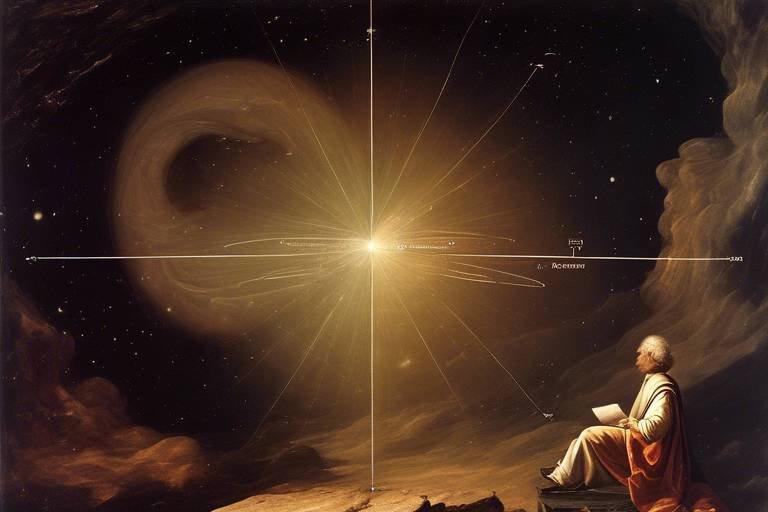Can Metaphysics Reveal the Nature of the Universe?
Have you ever gazed up at the stars and wondered what lies beyond our earthly existence? Or pondered the very fabric of reality itself? Metaphysics invites us into a realm of deep contemplation, where we seek to understand not just what exists, but why it exists. This branch of philosophy digs into the fundamental nature of reality, existence, and the universe, attempting to peel back the layers of our understanding. So, can metaphysics truly reveal the nature of the universe? Let's embark on this intellectual adventure together!
At its core, metaphysics grapples with questions that science often leaves unanswered. While science excels at describing the "how" of the universe through empirical evidence and experimentation, metaphysics dives into the "why." It challenges us to consider the essence of being, the nature of objects, and the very concept of existence itself. Imagine standing at the edge of a vast ocean, where the waves represent scientific knowledge, and the depths below symbolize metaphysical inquiry. The ocean is beautiful and complex, but it is the depths that hold the mysteries of life.
Throughout history, metaphysical thought has evolved, influenced by brilliant minds who dared to question the status quo. From ancient philosophers like Plato and Aristotle to contemporary thinkers, each has contributed unique perspectives that have shaped our understanding of the cosmos. Plato’s theory of Ideal Forms suggests that our material world is merely a shadow of a higher reality, while Aristotle’s substance theory provides a framework for discussing the essence of existence. These ideas continue to resonate today, prompting us to explore the universe's true nature.
As we delve deeper into contemporary metaphysical questions, we find ourselves confronted with intriguing debates surrounding time, space, and causality. What is time? Is it a linear progression, or is it a more complex construct? And what about space—does it exist independently of the objects within it, or is it merely a relational concept? These questions are not just academic; they have profound implications for how we understand our place in the universe and our existence as conscious beings.
Moreover, the intersection of metaphysics and quantum physics opens a fascinating dialogue about the nature of reality. Quantum theories challenge our traditional notions of determinism and free will, raising questions about the very fabric of existence. Are we mere puppets dancing to the strings of fate, or do we possess the freedom to shape our own destinies? This age-old debate is central to metaphysical discussions, as it connects our understanding of the universe with our personal experiences of choice and agency.
In a world where science and philosophy often seem at odds, metaphysics serves as a bridge, inviting us to explore the deeper meanings behind the universe's mysteries. It encourages us to ask the big questions: What is the nature of reality? How do our perceptions shape our understanding of existence? And ultimately, what does it mean to be a part of this vast cosmos? As we navigate these profound inquiries, we may find that the answers lie not just in the stars above but within ourselves.
- What is metaphysics? Metaphysics is a branch of philosophy that studies the fundamental nature of reality, including concepts like being, existence, and the universe.
- How does metaphysics relate to science? While science focuses on empirical evidence and the "how," metaphysics delves into the "why," exploring the underlying principles that govern existence.
- Can metaphysics answer questions about the universe? Yes, metaphysics can provide insights and frameworks for understanding complex questions about the nature of reality, existence, and our place in the cosmos.
- What are some historical contributions to metaphysics? Key figures like Plato and Aristotle have shaped metaphysical thought through their theories, which continue to influence contemporary discussions.
- How does quantum physics intersect with metaphysics? Quantum physics raises questions about determinism and free will, prompting metaphysical inquiries into the nature of reality and existence.

Understanding Metaphysics
Metaphysics, at its core, is a fascinating branch of philosophy that dives deep into the fundamental nature of reality. Imagine it as the canvas upon which all other philosophical ideas are painted. It seeks to answer some of the most profound questions that humanity has grappled with for centuries: What does it mean to exist? What is the nature of being? And what is the universe really made of? These inquiries are not just academic exercises; they resonate with our everyday experiences and shape our understanding of the world around us.
One of the most compelling aspects of metaphysics is its exploration of concepts like being, existence, and the very fabric of the universe. Think of it as peeling back the layers of an onion, where each layer reveals a deeper truth about our existence. At times, the questions posed by metaphysics can feel abstract or esoteric, but they are crucial in framing our understanding of reality. For instance, when we ponder whether the universe is a chaotic explosion of particles or a harmonious system governed by laws, we are engaging in metaphysical thought.
Moreover, metaphysics doesn't exist in a vacuum; it intertwines with various disciplines, including science and theology. It challenges us to consider not just the physical aspects of the universe but also the underlying principles that govern them. This intersection is where things get really interesting! For example, when scientists study the cosmos, they are not only observing stars and galaxies but also grappling with metaphysical questions about the nature of time and space. Are they absolute entities, or do they depend on our perception? These inquiries bridge the gap between the tangible and the intangible, illuminating the profound complexities of existence.
To further illustrate the significance of metaphysics, consider its role in shaping our understanding of reality. It prompts us to ask questions like:
- What is the nature of reality?
- Do we have free will, or is everything predetermined?
- Is the universe infinite or finite?
These questions not only fuel philosophical debates but also inspire scientific research and exploration. The beauty of metaphysics lies in its ability to provoke thought and discussion, pushing the boundaries of what we know and understand about our existence.
In summary, metaphysics serves as a vital lens through which we can examine the essence of reality. It encourages us to ponder our place in the universe and the nature of the universe itself. As we embark on this journey through metaphysical thought, we open ourselves to a world of possibilities, challenging our perceptions and expanding our understanding of existence.

The Role of Philosophy in Science
Philosophy and science have always shared a complex relationship, one that is both intertwined and distinct. At its core, philosophy acts as a guiding light, illuminating the questions that science seeks to answer. While science is grounded in empirical evidence and experimentation, philosophy delves into the underlying principles and assumptions that shape scientific inquiry. This interplay is crucial for the advancement of knowledge, as it helps frame the questions about existence, reality, and the universe that scientists strive to explore.
Consider this: every scientific experiment begins with a hypothesis, a conjecture about the nature of reality. But where do these hypotheses come from? They often stem from philosophical inquiries about what is real, what can be known, and what constitutes evidence. For instance, when a physicist studies the behavior of particles at a quantum level, they are not merely observing phenomena; they are engaging with profound metaphysical questions about the nature of reality itself. Is the universe deterministic, or is there room for randomness? These questions are not just scientific; they are philosophical at their core.
Moreover, philosophy challenges the assumptions that underpin scientific theories. It asks us to consider the implications of scientific discoveries and how they align with our understanding of existence. For instance, when we discuss the theory of relativity, we must also grapple with the philosophical implications of time and space. Are they absolute, or are they constructs of human perception? This is where philosophical discourse becomes invaluable, as it encourages critical thinking and a deeper understanding of the universe.
To illustrate the connection between philosophy and science, let's take a look at some key areas where philosophical inquiry has shaped scientific thought:
| Philosophical Concept | Scientific Implication |
|---|---|
| Empiricism | Foundation of the scientific method; emphasizes observation and experimentation. |
| Determinism | Influences theories in physics, particularly in classical mechanics. |
| Realism vs. Idealism | Shapes debates about the nature of scientific theories and models. |
| Ontology | Explores the nature of existence and what entities can be said to exist in the universe. |
In conclusion, the role of philosophy in science cannot be overstated. It provides the framework within which scientific inquiry operates, guiding researchers as they navigate the complexities of existence and reality. By questioning assumptions, exploring implications, and framing inquiries, philosophy enriches our understanding of the universe. It invites us to ponder not just the "how" of scientific phenomena but also the "why," ensuring that our quest for knowledge is as profound as it is empirical.
- How does philosophy influence scientific theories? Philosophy provides the foundational questions and assumptions that shape scientific theories, helping scientists to explore deeper meanings behind their findings.
- Can science exist without philosophy? While science relies on empirical evidence, philosophy is essential for framing questions and understanding the implications of scientific discoveries.
- What are some philosophical questions in science? Questions about the nature of reality, the existence of free will, and the implications of quantum mechanics are just a few examples of philosophical inquiries that intersect with science.

Historical Perspectives on Metaphysics
Throughout the ages, metaphysics has been a cornerstone of philosophical inquiry, shaping our understanding of existence and the universe. The journey through metaphysical thought is like traversing a vast landscape dotted with the towering peaks of influential philosophers who have left their indelible marks on the field. From ancient Greece to modern times, the evolution of metaphysical ideas reflects humanity's quest to grapple with the profound mysteries of reality.
One of the earliest and most significant figures in this journey is Plato. His theory of Ideal Forms posits that the material world we perceive is merely a shadow of a higher, more perfect reality. Imagine a world where everything you see is just a reflection in a funhouse mirror—it's distorted and incomplete. Plato believed that true knowledge comes from understanding these Ideal Forms, which exist beyond our physical realm. This notion not only influenced subsequent philosophical thought but also laid the groundwork for later metaphysical discussions about existence and reality.
Following in Plato's footsteps, Aristotle introduced a contrasting perspective with his Substance Theory. He argued that substances, or individual entities, are the fundamental components of reality. Aristotle's approach is akin to dissecting a complex machine to understand how each part contributes to its overall function. By focusing on the tangible aspects of existence, he provided a foundation for discussing the physical universe in metaphysical terms. His insights have resonated through the centuries, influencing not only philosophy but also the development of science.
As we move through history, we encounter other pivotal thinkers, such as René Descartes, whose famous dictum "Cogito, ergo sum" ("I think, therefore I am") sparked debates about consciousness and existence. Descartes' dualism—separating mind and body—invites us to ponder the nature of reality itself. Is our conscious experience the ultimate truth, or is it merely a byproduct of physical processes? This question continues to reverberate in contemporary metaphysical discussions.
In the modern era, philosophers like Immanuel Kant challenged the very foundations of metaphysical inquiry. Kant argued that our understanding of reality is shaped by our perceptions and cognitive frameworks, suggesting that we can never truly know the "thing-in-itself." His work invites us to consider whether objective reality exists independently of our experiences or if it is forever colored by our subjective interpretations.
Today, the exploration of metaphysics is far from over. The legacy of these historical perspectives informs ongoing debates about the nature of reality, existence, and the cosmos. As we delve into contemporary metaphysical questions, we stand on the shoulders of giants, seeking answers to the same profound queries that have captivated thinkers for centuries.
| Philosopher | Key Idea | Impact on Metaphysics |
|---|---|---|
| Plato | Ideal Forms | Introduced the concept of a higher reality beyond the material world. |
| Aristotle | Substance Theory | Focused on individual entities as the building blocks of reality. |
| René Descartes | Mind-Body Dualism | Explored the relationship between consciousness and physical existence. |
| Immanuel Kant | Categorical Imperative | Proposed that our understanding of reality is shaped by our perceptions. |
In summary, the historical perspectives on metaphysics provide a rich tapestry of ideas that continue to influence our understanding of the universe. Each philosopher contributed a unique thread, weaving together a complex narrative that challenges us to question our assumptions about reality and existence. As we look to the future, the insights gleaned from these thinkers will undoubtedly continue to inspire new explorations into the nature of the cosmos.
- What is metaphysics? Metaphysics is a branch of philosophy that deals with the fundamental nature of reality, including concepts such as being, existence, and the universe.
- How does metaphysics relate to science? Metaphysics provides a philosophical framework that helps shape scientific inquiry by framing questions about existence and reality.
- Who are some key figures in metaphysical thought? Notable philosophers include Plato, Aristotle, René Descartes, and Immanuel Kant, each contributing uniquely to metaphysical discussions.
- What are some contemporary metaphysical questions? Modern metaphysics explores topics such as the nature of time, space, causality, and the relationship between determinism and free will.

Plato’s Ideal Forms
Plato’s theory of Ideal Forms is a fascinating concept that has shaped philosophical thought for centuries. At its core, this theory posits that the material world we perceive through our senses is merely a shadow or a reflection of a higher, more perfect reality. Imagine walking through a museum filled with stunning replicas of famous sculptures. While these replicas may be beautiful, they are not the original masterpieces. In a similar way, Plato argued that the physical objects we encounter daily are just imitations of their true, ideal forms that exist in an abstract realm.
According to Plato, these Ideal Forms are unchanging and eternal, representing the essence of all things. For instance, consider the concept of beauty. While you might see various beautiful objects in the world—like a breathtaking sunset or a captivating piece of art—Plato would argue that these are just reflections of the true Form of Beauty, which is perfect and exists beyond our physical realm. This idea leads to profound questions about existence and reality: if our world is just a reflection, what does that say about our understanding of truth and knowledge?
To further grasp the implications of Plato's Ideal Forms, let's consider some key characteristics:
- Universality: Ideal Forms are universal concepts that apply to all instances of a particular category. For example, the Form of a circle is perfect and applies to every circular object, regardless of its imperfections.
- Immutability: Unlike physical objects that can change or decay, Ideal Forms are unchanging and eternal. They exist outside of time and space.
- Accessibility through Reason: Plato believed that humans could access these Ideal Forms through intellectual reasoning rather than sensory experience. This suggests that knowledge is not derived from what we see but from what we understand.
Plato’s Ideal Forms not only challenge our perception of reality but also influence various areas of thought, including ethics, politics, and art. By proposing that there exists a perfect version of every concept, Plato encourages us to strive for higher ideals in our lives. For instance, in ethics, the pursuit of justice is not merely about following laws but understanding the essence of justice itself as an Ideal Form.
In conclusion, Plato’s Ideal Forms invite us to reflect on the nature of reality and existence. They encourage a deeper exploration of the world around us, pushing us to question the very essence of what we perceive. Are we merely observers of shadows, or can we strive to understand the true forms that lie beyond our immediate experience? This philosophical inquiry remains relevant, as it challenges us to seek a deeper understanding of the universe and our place within it.
- What are Plato's Ideal Forms? Plato's Ideal Forms are abstract, perfect representations of concepts that exist beyond our physical world. They are the true essence of things, while our physical world is just a reflection of these ideals.
- How do Ideal Forms relate to the physical world? According to Plato, the physical world is an imperfect imitation of the Ideal Forms. For example, all beautiful things are reflections of the perfect Form of Beauty.
- Can we access Ideal Forms? Plato believed that we can access Ideal Forms through intellectual reasoning and philosophical inquiry, rather than through our sensory experiences.

Aristotle’s Substance Theory
Aristotle’s Substance Theory is a cornerstone of his metaphysical framework, offering profound insights into the nature of reality and existence. At its core, this theory posits that substances are the fundamental entities that make up the universe. For Aristotle, a substance is not merely a collection of properties or attributes; rather, it is something that exists independently and has its own essence. This concept can be likened to the idea of a tree: while its leaves, branches, and color can change, the tree itself remains a distinct entity, embodying the essence of 'treeness.'
Aristotle categorized substances into two main types: primary substances and secondary substances. Primary substances are individual entities, such as a specific person or a particular dog, which exist independently. Secondary substances, on the other hand, refer to the species or genera to which primary substances belong. For instance, while 'Socrates' is a primary substance, 'human' represents a secondary substance. This distinction is crucial because it helps us understand how individual entities relate to broader categories of existence.
Moreover, Aristotle introduced the concept of hylomorphism, which suggests that every substance is a composite of matter and form. Matter represents the physical substance, while form is the essence or the defining characteristics that make an entity what it is. To visualize this, think of a sculptor creating a statue: the marble is the matter, and the sculptor's design is the form. This interplay between matter and form is essential for understanding how substances exist and change in the universe.
Aristotle’s Substance Theory also emphasizes the importance of causality in understanding existence. He identified four types of causes that explain why a substance is the way it is:
- Material Cause: What something is made of (e.g., the wood of a table).
- Formal Cause: The design or essence of the substance (e.g., the shape of the table).
- Efficient Cause: The agent or process that brings something into being (e.g., the carpenter who builds the table).
- Final Cause: The purpose or function of the substance (e.g., the table's role in providing a surface for dining).
By examining these causes, we gain a deeper understanding of how substances interact and exist within the cosmos. Aristotle’s approach invites us to consider not just what things are, but why they are, which is a fundamental inquiry in both metaphysics and science.
In conclusion, Aristotle's Substance Theory provides a robust framework for exploring the nature of existence. By differentiating between primary and secondary substances, introducing hylomorphism, and outlining the four causes, Aristotle laid the groundwork for future metaphysical and scientific exploration. His insights continue to resonate today, prompting us to ponder the very fabric of reality and our place within it.
- What is the main idea of Aristotle's Substance Theory? Aristotle's Substance Theory posits that substances are the fundamental entities of reality, composed of matter and form.
- How does Aristotle differentiate between primary and secondary substances? Primary substances are individual entities (like a specific dog), while secondary substances refer to the categories or species they belong to (like the species 'dog').
- What is hylomorphism? Hylomorphism is the theory that every substance is a combination of matter (the physical substance) and form (the essence or defining characteristics).
- What are the four causes identified by Aristotle? The four causes are material cause, formal cause, efficient cause, and final cause, each explaining different aspects of why substances exist as they do.

Contemporary Metaphysical Questions
In today's world, the realm of metaphysics is as vibrant as ever, grappling with questions that challenge our understanding of existence and reality. With advancements in science and technology, particularly in physics and cosmology, we find ourselves at the crossroads of ancient philosophical inquiries and modern scientific discoveries. One might wonder: What is the essence of reality? Is it merely a construct of our perceptions, or does it exist independently of our minds? These questions are not just abstract musings; they are fundamental to our understanding of the universe and our place within it.
Modern metaphysical discussions often revolve around several key themes. For instance, the nature of time has become a hot topic among philosophers and scientists alike. Is time linear, or can it be perceived as a cyclical entity? This question is reminiscent of the ancient debates between philosophers like Heraclitus, who believed in the constant flux of the universe, and Parmenides, who argued for the permanence of being. Today, physicists are exploring these ideas through theories such as relativity, which suggests that time is not a fixed entity but rather a dimension that can bend and stretch.
Another pressing issue in contemporary metaphysics is the nature of causality. Traditionally, we have viewed causation as a straightforward relationship: cause leads to effect. However, quantum mechanics challenges this notion, introducing phenomena that seem to defy our classical understanding. For example, the concept of quantum entanglement suggests that particles can be instantaneously connected, regardless of the distance separating them. This raises profound questions: Is our understanding of cause and effect fundamentally flawed? Or is there a deeper layer of reality that we have yet to comprehend?
Moreover, the debate surrounding determinism and free will continues to ignite passionate discussions. If our actions are predetermined by the laws of physics, what does that mean for our sense of agency? Are we merely puppets in a cosmic play, or do we possess the ability to shape our destinies? This dichotomy not only influences philosophical discourse but also has significant implications for ethics and morality. If we are not truly free, can we be held accountable for our actions?
To further illustrate these contemporary metaphysical questions, let’s consider the following table summarizing key themes and their philosophical implications:
| Theme | Key Questions | Philosophical Implications |
|---|---|---|
| Nature of Time | Is time linear or cyclical? | Challenges our understanding of existence and change. |
| Causality | Is causation a fixed relationship? | Questions the foundations of scientific inquiry. |
| Determinism vs. Free Will | Are our actions predetermined? | Impacts ethics and personal responsibility. |
As we delve deeper into these metaphysical inquiries, it becomes clear that they are not merely theoretical exercises. They resonate with our everyday lives, influencing how we perceive our existence and interact with the universe. In a world where science and philosophy increasingly intersect, the exploration of these questions may lead us to profound insights about the very fabric of reality.
In conclusion, contemporary metaphysical questions challenge us to rethink our assumptions and expand our understanding of existence. They invite us to engage in a dialogue that bridges the gap between ancient wisdom and modern discoveries, ultimately enriching our comprehension of the universe and our role within it.
- What is metaphysics? Metaphysics is a branch of philosophy that examines the fundamental nature of reality, including concepts such as being, existence, and the universe.
- How does metaphysics relate to modern science? Metaphysics provides a philosophical framework that helps shape scientific inquiries and questions about existence and reality.
- What are some key contemporary metaphysical questions? Some key questions include the nature of time, causality, and the debate between determinism and free will.
- Why are these questions important? They influence our understanding of reality, ethics, and our place in the universe.

Metaphysics and Quantum Physics
When we dive into the realm of metaphysics and quantum physics, we find ourselves at a fascinating intersection where philosophy meets the very fabric of reality. Quantum physics, with its counterintuitive principles and strange behaviors, challenges our traditional notions of existence and reality. Have you ever pondered how particles can exist in multiple states at once or how they can be entangled over vast distances? These phenomena not only boggle the mind but also raise profound metaphysical questions about the nature of the universe.
At its core, quantum physics reveals that the universe is not as straightforward as it seems. The famous double-slit experiment illustrates this beautifully. When particles are fired at a barrier with two slits, they create an interference pattern, suggesting that they behave like waves. However, when observed, they act like particles, collapsing into a single state. This brings us to a crucial metaphysical question: What is the role of the observer in determining reality? Is reality something that exists independently of our observation, or is it contingent upon our perception?
Moreover, quantum entanglement introduces another layer of complexity. Two particles can become entangled, meaning the state of one instantly influences the state of another, no matter the distance between them. This phenomenon seems to defy the classical understanding of causality and locality, leading us to question the very structure of reality. Could it be that our universe is interconnected in ways we have yet to fully comprehend? Metaphysically, this suggests a universe that is more of a web of relationships rather than a collection of isolated entities.
To further explore this relationship, let's consider some key metaphysical implications of quantum physics:
- Reality as a Construct: Some interpretations of quantum mechanics suggest that reality may not be an objective entity but rather a construct influenced by observation.
- Non-locality: The concept of entanglement implies that information can be shared instantaneously across vast distances, challenging our conventional notions of space and time.
- Potentiality vs. Actuality: Quantum physics posits that particles exist in a state of potentiality until observed, raising questions about the nature of existence itself.
As we ponder these ideas, it becomes clear that the dialogue between metaphysics and quantum physics is not just an academic exercise; it has real implications for how we understand ourselves and our place in the universe. Are we merely passive observers in a deterministic universe, or do our choices and perceptions actively shape reality? This ongoing conversation invites us to reconsider long-held beliefs about existence, knowledge, and the cosmos.
In conclusion, the interplay between metaphysics and quantum physics opens up a treasure trove of questions that challenge our understanding of reality. As we continue to explore these concepts, we may find that the universe is not just a physical entity but a rich tapestry of relationships, perceptions, and possibilities waiting to be unraveled.
- What is the relationship between metaphysics and quantum physics?
Metaphysics explores fundamental questions about existence and reality, while quantum physics challenges our understanding of these concepts through its counterintuitive principles. - Can quantum physics prove metaphysical theories?
While quantum physics raises questions that metaphysics seeks to answer, it does not provide definitive proof for metaphysical theories; rather, it offers a framework for exploring them. - How does observation affect reality in quantum physics?
The act of observation in quantum physics appears to influence the state of particles, leading to debates about whether reality exists independently of our perception.

Determinism vs. Free Will
The debate between determinism and free will is one of the most captivating and complex discussions in metaphysics. At its core, this discourse grapples with the question: Are our actions predetermined by prior states of the universe, or do we possess the genuine ability to make choices independent of external influences? Imagine standing at a crossroads; one path leads to a preordained destination, while the other allows for spontaneous exploration. This metaphor encapsulates the essence of the determinism versus free will debate.
Determinism posits that every event, including human actions, is the outcome of preceding events governed by the laws of nature. This view suggests that if we had complete knowledge of the universe's state at any given moment, we could predict all future events with absolute certainty. Think of it like a giant cosmic clock, where every tick is a consequence of the previous one. Philosophers like Baruch Spinoza and David Hume have argued in favor of this perspective, asserting that our sense of choice is merely an illusion crafted by our ignorance of the underlying causal chains.
On the flip side, the concept of free will champions the idea that individuals can make choices that are not entirely dictated by prior causes. This perspective emphasizes personal agency and moral responsibility. Imagine a painter standing before a blank canvas, with the freedom to create whatever they desire. This analogy reflects the belief that, despite external influences, we retain the power to shape our destinies. Philosophers such as Jean-Paul Sartre and William James advocate for this view, arguing that our conscious choices define our existence and give meaning to our lives.
However, the conversation doesn't end there. The clash between these two viewpoints raises several intriguing questions:
- Can we truly hold individuals accountable for their actions if determinism is accurate?
- How do concepts of morality and ethics fit within a deterministic framework?
- Is it possible to reconcile elements of both views to form a more comprehensive understanding of human behavior?
Modern discussions often incorporate insights from neuroscience, which have shown that many decisions occur subconsciously before we are even aware of them. This revelation adds another layer of complexity to the debate. If our brains are making choices without our conscious input, what does that mean for our understanding of free will? Are we merely puppets dancing to the strings of biological and environmental influences, or do we still possess a degree of control over our actions?
To better understand these concepts, consider the following table that outlines the key differences between determinism and free will:
| Aspect | Determinism | Free Will |
|---|---|---|
| Definition | Every event is determined by preceding events and natural laws. | Individuals have the power to make choices independent of prior causes. |
| Philosophers | Spinoza, Hume | Sartre, James |
| Implications | Challenges notions of moral responsibility. | Affirms personal agency and accountability. |
Ultimately, the debate between determinism and free will is not just an academic exercise; it has profound implications for how we understand ourselves and our place in the universe. As we navigate this intricate web of existence, we are left to ponder: Are we the architects of our destinies, or are we simply players in a grand cosmic play, bound by the script of the universe? The answers may not be clear-cut, but the exploration of these ideas invites us to reflect deeply on the nature of reality and our role within it.
- What is determinism? Determinism is the philosophical belief that all events, including human actions, are determined by preceding events in accordance with the natural laws.
- What is free will? Free will is the concept that individuals can make choices that are not entirely dictated by external influences or prior causes.
- Can determinism and free will coexist? Some philosophers argue for a compatibilist view, suggesting that free will can exist within a deterministic framework, allowing for personal agency while acknowledging causal influences.

The Nature of Reality
The nature of reality is one of the most profound questions we can ponder. What does it mean to exist? Is what we perceive truly real, or are we merely experiencing an elaborate illusion? These questions have baffled thinkers for centuries, and they remain at the forefront of metaphysical inquiry. In essence, reality can be viewed through various lenses, each offering unique insights and challenges to our understanding of the universe.
At its core, reality is often divided into three main philosophical perspectives: realism, idealism, and constructivism. Each of these frameworks attempts to explain the relationship between our perceptions and the external world. Let's break these down:
- Realism: This perspective posits that the universe exists independently of our perceptions. In other words, reality is objective, and our senses provide us with a direct window into this external world. Think of it like a photograph; it captures a moment in time, regardless of who views it.
- Idealism: In stark contrast, idealism suggests that reality is fundamentally mental or spiritual. According to this view, the material world is a construct of our perceptions, much like a dream that dissolves upon waking. Imagine viewing a beautiful painting; the colors and shapes exist only in the mind of the observer.
- Constructivism: This philosophy merges elements of both realism and idealism. It argues that while there is an objective reality, our understanding and interpretation of it are shaped by our experiences and social contexts. Picture a group of people trying to describe a sunset; each description is valid, yet they all highlight different aspects of the same event.
These perspectives not only enrich our understanding of reality but also influence how we approach scientific inquiry. For instance, a scientist operating from a realist viewpoint may focus on empirical data, while one influenced by idealism might explore the implications of consciousness on existence. The interplay between these views is fascinating and can lead to profound insights about the universe.
Moreover, contemporary discussions about reality often intersect with advancements in quantum physics. The strange behaviors of particles at the quantum level challenge our traditional notions of reality. Concepts like superposition and entanglement suggest that reality may not be as straightforward as we once thought. As we delve deeper into the quantum realm, we find ourselves questioning the very fabric of existence. Are particles real, or are they merely probabilities waiting to be observed? This question blurs the lines between metaphysics and empirical science, inviting us to reconsider our definitions of reality.
In conclusion, the nature of reality is a rich tapestry woven from diverse philosophical threads. Each perspective offers valuable insights that can help us navigate the complexities of existence. As we continue to explore these ideas, we may find ourselves not only questioning what is real but also discovering new dimensions of understanding that could transform our perception of the universe.
- What is the difference between realism and idealism? Realism asserts that the universe exists independently of our perceptions, while idealism claims that reality is a construct of our minds.
- How does quantum physics relate to metaphysics? Quantum physics challenges traditional notions of reality, suggesting that particles may exist in a state of probability until observed, which raises questions about the nature of existence itself.
- Can metaphysics and science coexist? Yes, metaphysics can provide a philosophical foundation for scientific inquiry, helping to frame the questions that guide exploration and understanding of the universe.
Frequently Asked Questions
- What is metaphysics?
Metaphysics is a branch of philosophy that investigates the fundamental nature of reality. It explores concepts such as being, existence, and the universe, aiming to answer profound questions about life and the cosmos.
- How does metaphysics relate to science?
Metaphysics plays a crucial role in shaping scientific inquiry by framing essential questions about existence and reality. It guides scientific exploration and helps in understanding the universe's complexities.
- Who are some key figures in metaphysical thought?
Throughout history, philosophers like Plato and Aristotle have significantly contributed to metaphysical thought. Plato's theory of Ideal Forms and Aristotle's substance theory are foundational ideas that continue to influence our understanding of reality.
- What are contemporary metaphysical questions?
Modern metaphysics tackles questions about the nature of time, space, and causality. Current debates and theories within metaphysics are essential for understanding the universe and our place within it.
- How does metaphysics intersect with quantum physics?
The relationship between metaphysics and quantum physics raises intriguing questions about reality. Metaphysical concepts can provide insights into quantum theories, enhancing our understanding of the universe's fundamental nature.
- What is the debate between determinism and free will?
This debate is central to metaphysics, exploring how these concepts relate to our understanding of the universe and human existence. It questions whether our actions are predetermined or if we have the freedom to choose.
- What constitutes reality in metaphysical terms?
Various metaphysical perspectives, including realism, idealism, and constructivism, offer different interpretations of reality. Understanding these perspectives is crucial for grasping the complexities of the universe.



















